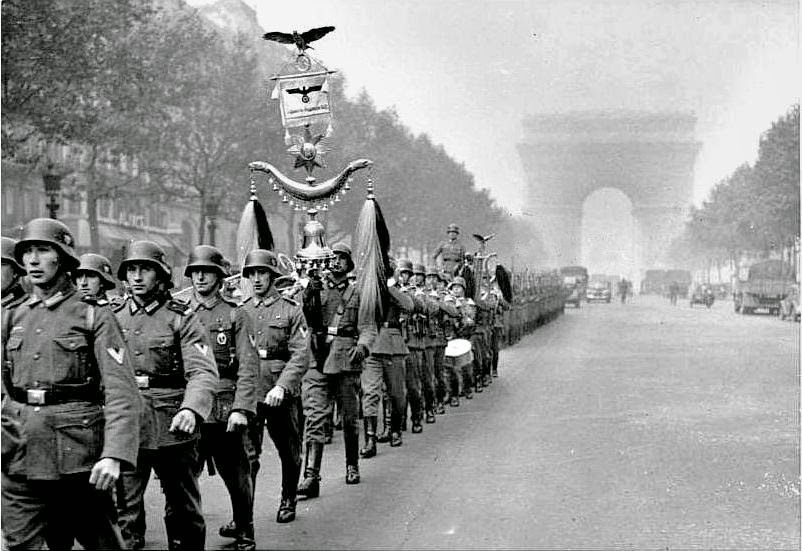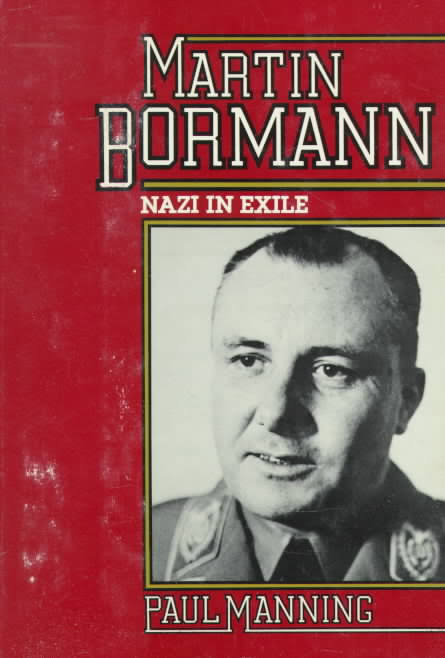Nazi Owned Corporations Control French Economy
September 17, 2015

(left, Nazis march down Champs de Elyse)
How Germany Rose From Nazi Ashes-2
The Role of Argentina and France
Martin Bormann: Nazi in Exile (1981) by Paul Manning - Below are excerpts from a summary by Dave Emory, who deserves credit for keeping this story alive.
Long after the war, the BorÂmann orgaÂniÂzaÂtion conÂtinÂued to wield effecÂtive conÂtrol of the French econÂomy, utiÂlizÂing the corÂpoÂrate relaÂtionÂships develÂoped before and durÂing the occupation. This control is exercised by a shadowy network of personal contacts, the Illuminati, which includes both Nazis and their erstwhile "enemies."
by Paul Manning
(henrymakow.com)
Among the many countries that figured in an important way in the Bormann structure were Argentina and France.
When BorÂmann gave the go-ahead in his overÂall flight capÂiÂtal proÂgram after the deciÂsions at StrasÂbourg, [in August 1944] over $6 bilÂlion of this money flowed into Buenos Aires for investÂment there and elseÂwhere in Latin AmerÂica. The investÂments covÂered facÂtoÂries, hotels, resorts, catÂtle, banks, land, sugar and cofÂfee planÂtaÂtions, metÂalÂlurgy, insurÂance, elecÂtriÂcal prodÂucts, conÂstrucÂtion, and comÂmuÂniÂcaÂtions. It is much the same investÂment specÂtrum as estabÂlished in Spain. West GerÂman [i.e. Nazi] investÂments today account for nearly 45 perÂcent of all forÂeign investÂments in Spain.
French finanÂcial instiÂtuÂtions were cenÂtral to the BorÂmann plan. Before D-day four Paris banks, Worms et Cie., Banque de Paris et de Pays-Bas, Banque de l'Indochine (now with 'et de Suez' added to its name), and Banque Nationale pour le ComÂmerce et l'Industrie (now Banque Nationale de Paris), were used by BorÂmann to siphon NSDAP and other GerÂman money in France to their bank branches in the colonies, where it was safeÂguarded and invested for its GerÂman ownership. (Ibid.; p. 140.)
In the years before the war, the GerÂman busiÂnessÂmen, indusÂtriÂalÂists, and bankers had estabÂlished close ties with their counÂterÂparts in France. After the blitzkrieg and invaÂsion, the same FrenchÂmen in many cases went on workÂing with their GerÂman peers. They didn't have much choice, to be sure, and the occuÂpaÂtion being instiÂtuted, very few in the high echÂeÂlons of comÂmerce and finance failed to colÂlabÂoÂrate. The Third Republic's busiÂness elite was virÂtuÂally unchanged after 1940 . . .

They regarded the war and Hitler as an unforÂtuÂnate diverÂsion from their chief misÂsion of preÂventÂing a comÂmuÂnist revÂoÂluÂtion in France. AntiÂbolÂsheÂvism was a comÂmon denomÂiÂnaÂtor linkÂing these FrenchÂmen to GerÂmans, and it accounted for a volÂunÂteer French diviÂsion on the EastÂern Front. . .The upper-class men who had been superbly trained in finance and adminÂisÂtraÂtion at one of the two grand corps schools were referred to as France's perÂmaÂnent 'wall of money,' and as proÂfesÂsionÂals they came into their own in 1940. They agreed to the estabÂlishÂment of GerÂman subÂsidiary firms in France and perÂmitÂted a genÂeral buy-in to French companies.
The GerÂman ecoÂnomic conÂtrol of the French econÂomy proÂceeded smoothly into the postÂwar period. Long after the war, the BorÂmann orgaÂniÂzaÂtion conÂtinÂued to wield effecÂtive conÂtrol of the French econÂomy, utiÂlizÂing the corÂpoÂrate relaÂtionÂships develÂoped before and durÂing the occupation.
The charÂacÂterÂisÂtic secrecy surÂroundÂing the actions of GerÂman indusÂtriÂalÂists and bankers durÂing the final nine months of the war, when Bormann's flight capÂiÂtal proÂgram held their comÂplete attenÂtion, was also carÂried over into the postÂwar years, when they began pulling back the skeins of ecoÂnomic wealth and power that stretched out to neuÂtral nations of the world and to forÂmerly occuÂpied lands.
There was a sugÂgesÂtion of this in France. Flora Lewis, writÂing from Paris in the New York Times of August 28, 1972, told of her conÂverÂsaÂtion with a French pubÂlisher: 'It would not be posÂsiÂble to trace ownÂerÂship of corÂpoÂraÂtions and the power strucÂture as in the United States. 'They' would not perÂmit it. 'They' would find a way to hound and torÂture anyÂone who tried,' commented the pubÂlisher. 'They' seem to be a fairly small group of peoÂple who know each other, but many are not at all known to the pubÂlic. 'They' move in and out of govÂernÂment jobs, but pubÂlic serÂvice apparÂently serves to win priÂvate proÂmoÂtion rather than the other way around.
The GovÂernÂment 'conÂtrol' that pracÂtiÂcally everyÂone menÂtions canÂnot be traced through stock holdÂings, regÂuÂlaÂtory agenÂcies, pubÂlic deciÂsions. It seems to funcÂtion through a maze of perÂsonal conÂtacts and tacit underÂstandÂings.' The underÂstandÂings arrived at in the power strucÂture of France reach back to preÂwar days, were conÂtinÂued durÂing the occuÂpaÂtion, and have carÂried over to the present time.
Lewis, in her report from Paris, comÂmented furÂther: 'This hidÂden conÂtrol of govÂernÂment and corÂpoÂraÂtions has proÂduced a genÂeral unease in Paris.' Along with the unease, the fact that France has linÂgerÂing and seriÂous social and politÂiÂcal ailÂments is a residue of World War II and of an ecoÂnomic occuÂpaÂtion that was never really terÂmiÂnated with the withÂdrawal of GerÂman troops beyond the Rhine. It was this speÂcial ecoÂnomic relaÂtionÂship between GerÂman and French indusÂtriÂalÂists that made it posÂsiÂble for Friedrich Flick to arrange with the De-Wendel steel firm in France for purÂchase of his shares in his Ruhr coal comÂbine for $45 milÂlion, which was to start him once more on the road back to wealth and power, after years in prison folÂlowÂing his conÂvicÂtion at NuremÂberg.
West Germany's ecoÂnomic power strucÂture is fueled by a two-tier sysÂtem: the corÂpoÂraÂtions and indiÂvidÂuÂals who pubÂlicly repÂreÂsent the prodÂucts that are comÂmon houseÂhold names around the world, and the secreÂtive groups operÂatÂing in the backÂground as holdÂing comÂpaÂnies and who pull the threads of power in overÂseas corÂpoÂraÂtions estabÂlished durÂing the BorÂmann tenure in the Third Reich.
As explained to me, 'These threads are like the strands of a spider's web and no one knows where they lead -- except the inner cirÂcle of the BorÂmann orgaÂniÂzaÂtion in South America.
--






